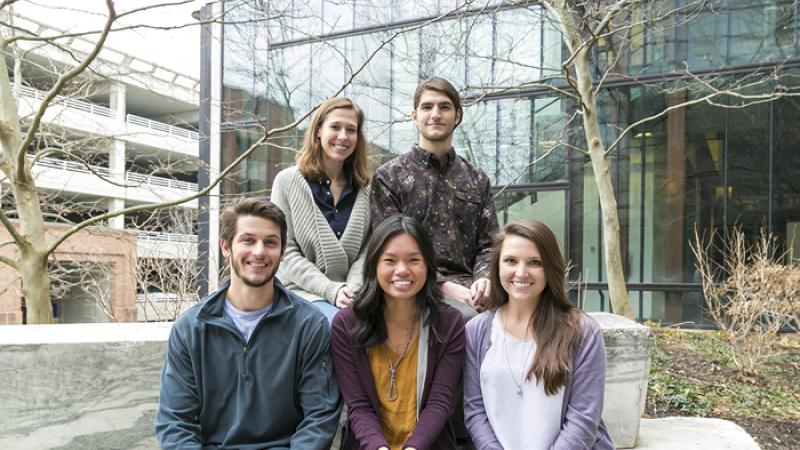Five Knowlton Students Awarded 2016 ARTA Grants
Five Knowlton School students are this year’s recipients of Architecture Research and Travel Awards (ARTA) which support independent research during summer 2016. This year’s awardees are:
- Anastasia Betsch (MLA), El Camino de Santiago: The Pilgrim’s Garden
- Katie Lau (BSARCH) and Andrew Miller (BSARCH), The Garden and the City
- Jonathan Staker (MLA), Western Watersheds: Lifeline Landscape
- Sandy Sechang (BSCRP), Syrian Refuges in Berlin
Betsch’s project will see her embark upon a pilgrimage along the El Camino de Santiago Frances through northern Spain. Every year, over 200,000 pilgrims trek the El Camino between April and October, resulting in a nomadic society, complete with their own communication style, dress, shelter and customs. Betsch’s goal is to study the ancient path and its infrastructures that support this nomadic pilgrim culture, as well as the relationship between pilgrim and site. As she stated in her proposal:
“Like landscape, the El Camino de Santiago has an ephemeral quality. You walk, and walk, and walk. The repetitive motion persists as your surroundings evolve seasonally and spatially, relationships form and disappear as your pace ebbs and flows, and worries, sins and burdens are shed as kilometers pass. A camino experience is seemingly singular as each pilgrimage is inexplicably tied to time. With this project I am asking, ‘Can we capture the ephemeral pilgrim journey and translate it to a choreographed landscape intervention relating and amplifying each discrete experience?’ Coupled with this research, I hope to build upon my directed research studio project for which I am proposing a method and process for the pilgrims to leave their mark on the landscape in exchange for this life-altering journey.”
Lau and Miller will travel throughout Great Britain, exploring the connection between the English Garden and the form of English cities and buildings. Their research will examine specific gardens, suburbs, existing cities and the important buildings within them. Lau and Miller will seek to find numerous connections linking these designed works. From their proposal:
“As cities continue to fight sprawl, destruction of countryside and organizational problems, while striving to preserve and create successful, well-loved neighborhoods, these precedents remain important. Collaboration between multiple disciplines and knowledge of other forms of design are relevant as designers work to revitalize cities. Our project argues the importance of the consideration of the city when practicing architecture and this relationship of part to whole is highlighted in gardens that can be read as microcosms of the city.”
Staker’s will investigate two of the main veins of western hydrological substance, the Rio Grande and Colorado River watersheds. Today, the Colorado watershed, serves over 40 million people in expanding metropolises like Denver, Las Vegas, Los Angeles, Phoenix, Tucson and San Diego. The Rio Grande watershed with headwaters in southwest, Colorado serves increasing populations in both U.S. and Mexican cities including, El Paso, Albuquerque, Santa Fe, Del Rio, Laredo and in Mexico; Cuidad Juarez, Ojinaga, and Ciudad Acuna. More significantly, these watersheds support the diverse, year round agricultural industry that serves the entire country (Philpott). This multi-faceted regional growth combined with increasing climatic irregularity has led to frequent periods of drought, severely stressing both of these river systems.
Staker’s project will focus on the following research themes: Landscapes of Production, exploring how the landscapes of both watersheds have been naturally crafted and manually engineered to optimize the availability of water in their respective regions; Landscape as Catalyst, examining how water is being utilized in the region both within rural and urban context; Protected Landscapes, investigating a lesser known fact about each watershed - that they represent some the most highly protected major river corridors in the world, and; Making Connections, seeking to understand what role landscape architecture is playing in the region addressing water scarcity and quality.
Sechang began her proposal with a quote from sociologist Saskia Sassen’s book Guests and Aliens in which she declared that we must “widen the options we envision for dealing with immigrants and refugees…” Sechang will travel to different parts of Berlin to learn how German cultural factors determine where Syrian refugees will be placed after gaining asylum. According to statistics from the German Federal Department for Migration and Refugees, the Syrian Refugee crisis caused 103,708 Syrians to file for asylum in 2015. Of those, more than 57,000 have been accepted.
Sechang’s hope is to see firsthand how Germany has integrated a large population into its urban environment and to learn methods that can transform the preconceived stereotype of refugees. This massive influx triggers critical improvement for the housing market, technology, waste, art and transportation infrastructure. In Berlin, Sechang will have the opportunity to explore the process of finding peace, and the sensitive cultural and societal roots that can offer guidance for urban planning in America.
The Knowlton School Architecture Research Travel Awards program was established to encourage independent travel and research initiatives of up to 30 days by Knowlton students from all degree programs. The ARTA program is made possible by generous support from the Columbus Foundation. In the fall semester following completion of their projects, ARTA winners present their work at the school.


